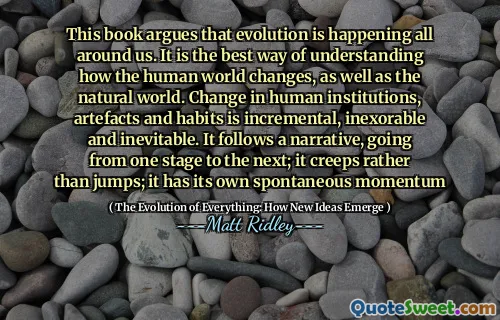"The Evolution of Everything: How New Ideas Emerge" explores the concept that progress and innovation occur through a gradual, evolutionary process rather than through sudden breakthroughs. The author, Matt Ridley, argues that ideas and developments often arise from collective contributions over time, shaped by cultural and social factors. This perspective challenges the notion that individual genius or landmark inventions are solely responsible for advancements in society.
The book delves into various fields, including science, technology, and the economy, illustrating how complex systems evolve through the interplay of numerous small changes. Ridley emphasizes the importance of spontaneity and how unplanned events can lead to major shifts. He highlights that many significant advancements are the result of collaborative efforts and the gradual accumulation of knowledge, rather than premeditated actions by singular inventors.
Ridley's work encourages readers to appreciate the intricate web of influences that contribute to progress, advocating for a view of evolution in ideas similar to biological evolution. By understanding this process, societies can foster environments conducive to innovation and growth, recognizing that often the most impactful changes are born from the collective intelligence and creativity of many rather than a few exceptional individuals.
More »
Today Birthdays
1729 -
Edmund Burke
1949 -
Haruki Murakami
1954 -
Howard Stern
1876 -
Jack London
1993 -
Zayn Malik
1951 -
Kirstie Alley
1863 -
Swami Vivekananda
1923 -
Alice Miller
1987 -
Naya Rivera
1825 -
Brooke Foss Westcott
1944 -
Joe Frazier
1951 -
Rush Limbaugh
1964 -
Jeff Bezos
1978 -
Jeremy Camp
1628 -
Charles Perrault
1856 -
John Singer Sargent
1970 -
Kaja Foglio
1953 -
Rick Santelli
1986 -
Gemma Arterton
1968 -
Raf Simons
1958 -
Christiane Amanpour
1966 -
Olivier Martinez
1996 -
Ella Henderson
1917 -
Maharishi Mahesh Yogi
1949 -
Ottmar Hitzfeld
1928 -
Ruth Brown
1968 -
Heather Mills
1946 -
George Duke
1968 -
Rachael Harris
1923 -
Ira Hayes

